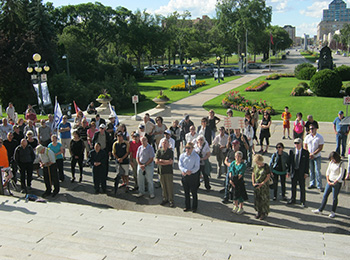WINNIPEG — About 100 Winnipeggers went to the steps of the Manitoba legislature July 30 to add their voices to thousands of others throughout North America condemning the nuclear deal the western powers recently signed with Iran.
Among the speakers at the ”Stop Iran Now” rally – organized by a coalition of Christian, Kurdish, Yazidi and Jewish groups, including Winnipeg Friends of Israel – were representatives of the Christian, Kurdish and Yazidi communities, as well as internationally known human rights advocate David Matas, University of Manitoba business professor Bryan Schwartz and Andrija Pavlic, a retired Canadian soldier.
Among the oft-repeated objections to the agreement are that no deal would have been better than the deal that was agreed to; that Iran can’t be trusted; that the deal makes it easier for Iran to get a nuclear weapon; and that sanctions against the Islamic Republic should have been toughened, not removed.
The rally began with a statement from Winnipeg South Centre Conservative MP Joyce Bateman, who was unable to attend. Bateman condemned Iran for supporting terrorism, threatening to destroy Israel and wholesale violations of human rights.
“Iran should be judged by its deeds, not its words,” she wrote.
She also noted Prime Minister Stephen Harper’s pledge when speaking in the Knesset last year that Canada would stand with Israel.
Pavlic, who served for nine years in the Canadian Armed Forces with Princess Patricia’s Canadian Light Infantry, with tours of duty in Bosnia and Afghanistan, said the deal is “absurd” and “catastrophic for Israel, the only free nation in the Middle East.”
He noted that Iran supplied weapons that were used to kill more than 150 Canadian soldiers serving in Afghanistan.”
Speaking for Winnipeg’s Yazidi community, Nafiya Naso said the Iran deal also opens the doors for Saudi Arabia and Turkey to join the nuclear club, and greatly increases the chances of nuclear war in the Middle East.
“Iran is not only a threat to Israel but to the whole world,” she said.
Farhad Sultanapa, of the Kurdish Association of Manitoba, called the deal a “historic mistake.” He described Iran as the “godfather of ISIS” and spoke about the hundreds of thousands of Iranian Kurds and other ethnic and religious minorities in Iran that the Iranian government has murdered over the years.
“Iran has shown no respect for humanity,” he said. “We have to protect the world from Iran.”
Rev. Rudy Fidel of Faith Temple compared U.S. President Barack Obama and Secretary of State John Kerry to former British Prime Minister Neville Chamberlain, who allowed Germany to annex Czechoslovakia by signing the Munich Agreement in 1938. Chamberlain claimed the treaty would bring “peace in our time.”
“The deal gives Iran an unconditional path to a nuclear bomb,” Rev. Fidel said. “Iran is a danger to the entire world.”
Don James, national development director for the Christian Zionist group Bridges for Peace Canada, said Iran must change before sanctions are removed.
“Iran supports terror abroad and at home. Appeasement is not the answer,” he said.
“I am proud that the government of Canada is standing with Israel and against appeasement. Peace can only come to the Middle East when Iran and all countries recognize the Jewish right to live in the Jewish homeland.”
Alluding to Iranians threats to destroy Israel, Schwartz referred to the Holocaust memorial on the grounds of the legislature and noted that one of his grandmothers was the only survivor of the Holocaust in her family.
“Anti-Semitism today is at levels not seen since the 1930s,” he said. “It is not safe for Jews anywhere in Europe to go out in public wearing any Jewish symbols. We should have learned from the Holocaust that if someone tells you they are going to kill you, you should listen.”
Schwartz wondered what would happen if the United States suspects that Iran is violating the terms of the deal.
“Will the Russians, the Chinese or the Europeans be willing to re-impose sanctions? Will a future American administration be able to sanction conventional Iranian weapons without Iran saying that that negates the nuclear deal?”
Matas listed a number of problems with the deal, which he said rewards Iran with a financial windfall of up to $150 billion (US) that it can use to promote terrorism throughout the Middle East and beyond. The deal also contains a number of loopholes, such as a 24-day advance warning period before any inspections, Matas said, and it’s a temporary agreement that doesn’t prevent Iran from developing nuclear weapons after 10 to 15 years. In addition, Iran can continue to violate human rights with impunity.
“It’s like chopping down one tree in a forest,” Matas said. “No deal would have been better than this deal.”
